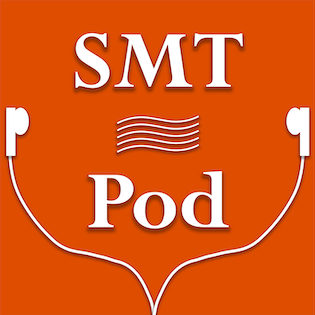Pitch a Pod: Submission Guidelines
See the Season 1 Call for Podcasts below.
Overview
SMT-Pod is a Open Collaborative Peer-Reviewed and creative venue for timely conversations about music theory. Audio-only podcasts offer a unique—though non-traditional—way of engaging with music, analysis, and contemporary issues in the field. As opposed to the heavy, jargon-laden publications we are used to working through at our desks, SMT-Pod publications are easy to listen to and think about in the car, on your run, or while grading.
The format of each episode is dictated by its content. For some topics, interviews with individual scholars or panel discussions may be effective; for others, sample lessons may prove useful; for more traditional analysis topics (that would not require visual aids), single-author lectures with plenty of audio examples may suffice. If none of these formats seem beneficial to the episode you are proposing, feel free to design your own. The choice is up to you!
We welcome proposals from all scholars: those who are avid podcast listeners and those who are less familiar with the medium; whether you have years of experience or are new to the recording process.
Publication Process
If you think you have an idea for SMT-Pod, here are some things you should prepare/consider as we work together to create your podcast using an open collaborative peer-review process.
Read more about why we use an
Open Collaborative Peer Review (OCPR) Process here
The initial proposal (300–500 words) should include information about the topic, format, and content of your episode. You’ll submit your proposal on this Google Form, where you’ll also be asked about the structure of the episode and any technological needs you may have. You can see specifics about the rest of the process below (click to open each phase):
- Submission of 300–500 word episode proposal (Submitted via this Google Form)
- Topic of episode
- Format of episode (single-author presentation, panel discussion, “tiny desk concert,” etc.)
- Length of episode [short (10–20 min.), medium (20–30 min.), long (30–45 min.)]
- Identifying information for all creators/participants (these will not be reviewed anonymously)
- Set of keywords
- Include why this topic is best addressed in a podcast format (as opposed to in a written article, SMT-V video, etc.)
- Program Committee evaluates the proposal individually (Open, collaborative peer review including communication between program committee and author), considering:
- Suitability for a podcast format
- Creation of a diverse set of topics in a season
- Possibility of reaching out to scholars in the field for commentary, relevant review, and/or contribution to the episode
- Meeting SMT’s language guidelines, policy on ethics, and policy on harassment
- Meeting with the proposer(s) to discuss:
- What podcast format would work best
- What topics should/can be covered
- Sources or persons to be added to the conversation?
- Needed technological support
Include:
- Proposer sends in a list of topics/questions and/or outline before recording
- Preparation of podcast episode with production committee (recording, editing, choosing bumper music)
- After recording, files are sent to the Tech Committee.
Any and all changes will be made in conversation with the proposer
- Author-chosen third-party peer/colleague (“reviewer”) listens to the episode and approves/collaborates. The third-party reviewer should not have any conflicts of interest or implicit bias which would compromise the integrity of the process. This third-party peer review could take the form of any of the following:
- Approval for release
- Working with the author(s) to improve/add to the podcast before release
- Providing a short segment at the end of the podcast with their commentary
- A promise of a follow-up episode
- A combination of the above and/or any other formats (with approval from the Program Committee and the author(s))
